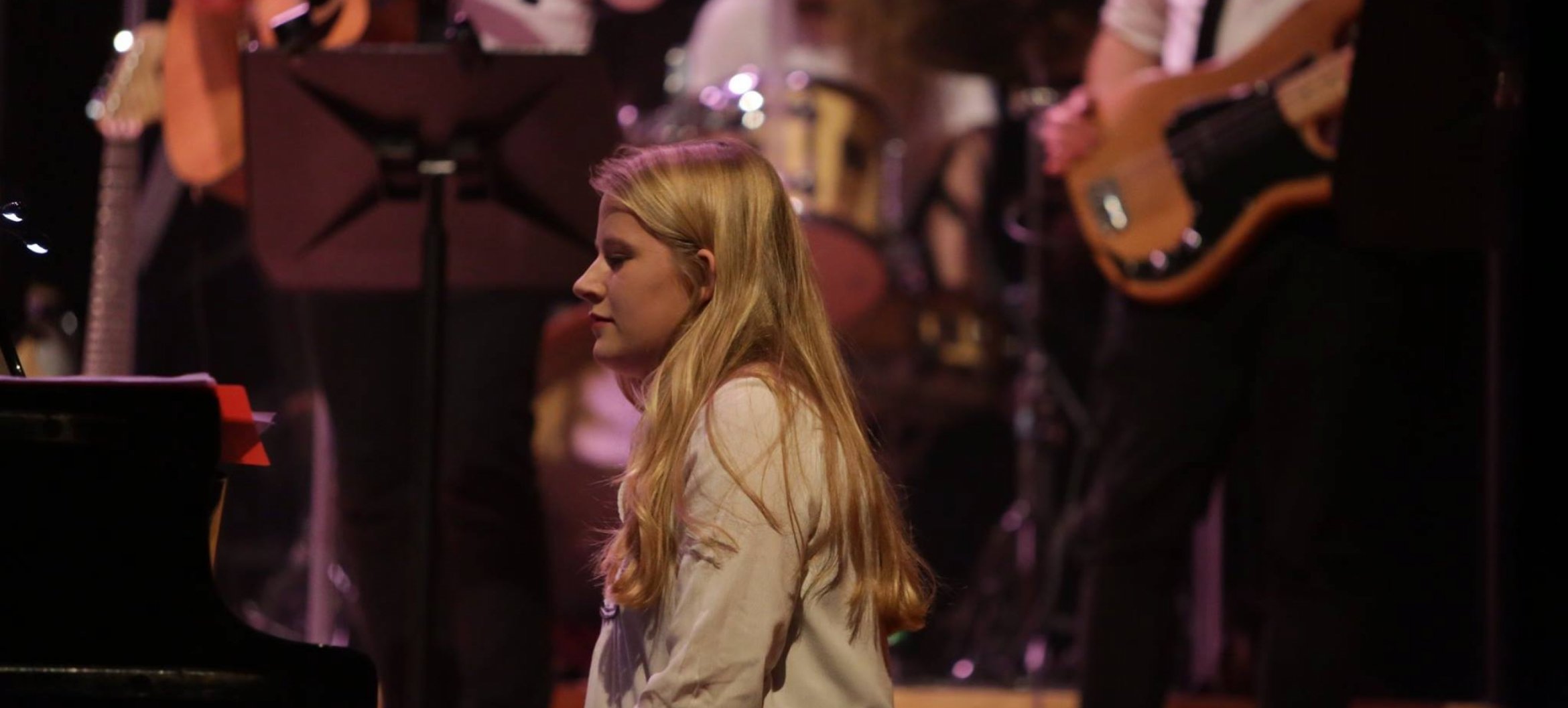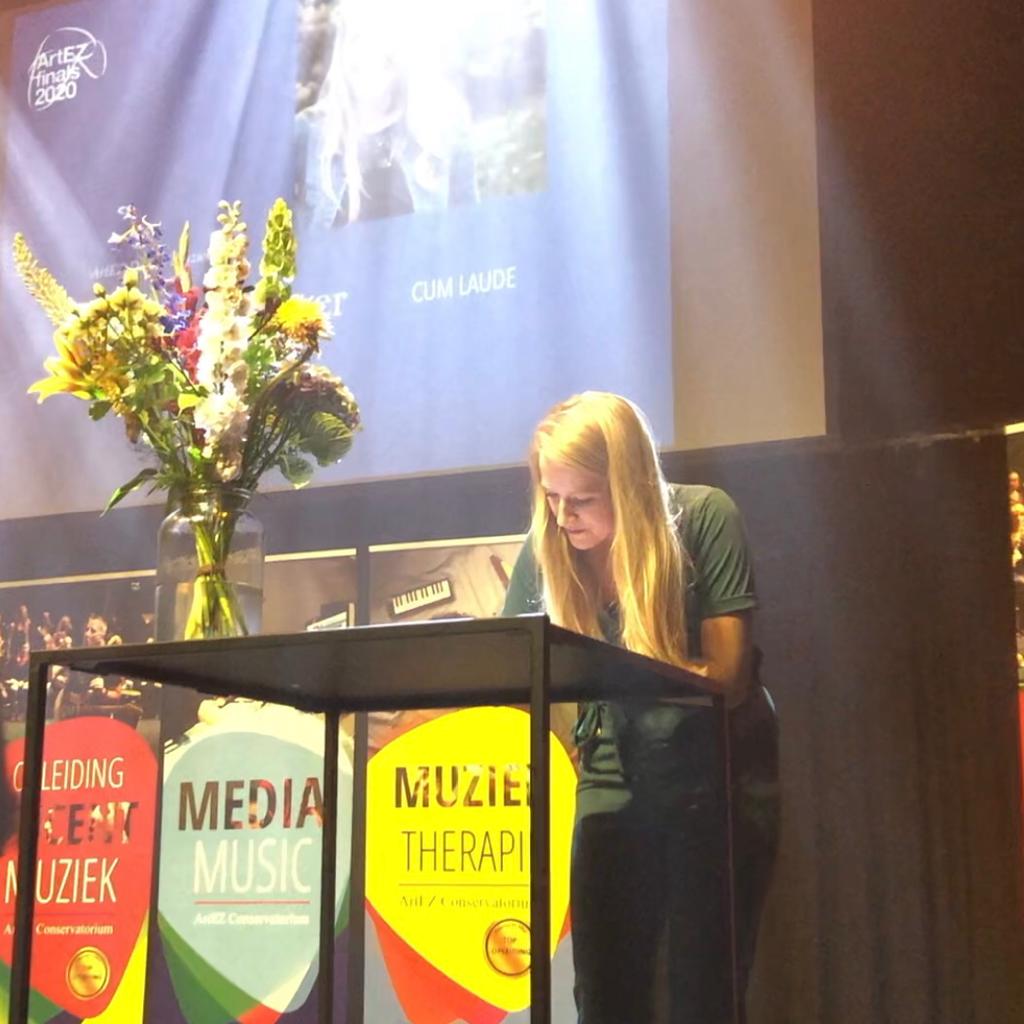'With my model, you can evaluate the process the student has gone through'

As a young child at ballet, she was always the one who danced out of time. So she hasn't always had a feeling for music.But fortunately, that has changed. These days, music is her biggest hobby. So much so that Myrthe Nijeboer has graduated from the Music in Education course in Enschede. A course that fitted her like a glove."I'm definitely going to miss it here."
Myrthe has been interested in music from a young age. She was keen to have music lessons as a child. Unfortunately that never happened, until she was given a keyboard for her eleventh birthday which meant she could take piano classes at music school. Myrthe: "I stopped after three years. I wasn't enjoying the lessons at music school because I had to read music. I was much happier teaching myself the piano, for example by choosing songs on YouTube and listening to a lot of music."
Academy of Music
She proved to be a pretty decent pianist. A mentor at the school saw that, and recommended her to consider the Academy of Music. That's how she ended up at ArtEZ. “It was exactly the right place for me! The subjects were very diverse, it was really a combination of music and teaching, and besides that you had to work together a lot with other people on the course. I enjoyed almost everything."
Teaching yourself
One of the subjects she liked was the Music Writing Workshop. Alongside the Ear Training Practicum and Music History, that is part of the Music Theory Workshop. This subject was about teaching music theory – a special approach which places the emphasis on the students doing, rather than listening to the lecturer. It's more student focused than lecturer focused. "In my third year, I was asked by the then head of the course Marja Reinders whether I would like to teach in the Music Writing Workshop in the future."
Making compositions
The Music Writing Workshop aims to get students to absorb music theory by making their own compositions, for example. That means the students are really working with music. Hence the name ‘Workshop’. “This is an ArtEZ concept. It is applied in Zwolle and Enschede on the Music Therapy and Music in Education courses.”
Students have to incorporate theoretical aspects in the compositions they make. In her research, Myrthe looked into how those compositions are evaluated. "And I explored what an assessment model might look like if the product assessment was visible and the process the student had gone through was also visible and assessable.”
Process
As a lecturer in the Music Writing Workshop, you really need to be able to put your own taste to one side, says Myrthe. “Because that's the fairest way. One lecturer might think a composition is terrific, while another lecturer might hate it. All the same, the lecturer needs to give the fairest possible assessment. In doing so, they look at things like whether the music theory aspects have been successfully incorporated – form, melody, and so on – and the process a student has gone through."
Assuring objectivity
It turns out that assessing students’ own compositions is very difficult. Assessing music objectively is almost impossible. Nevertheless, the research has yielded valuable information and the results may be applied within the Music Writing Workshop in the future. For example, in order to assure objectivity, in the model compositions are assessed by multiple lecturers. That sounds labour-intensive, but to overcome that problem an automated assessment has been introduced.

Assessment model
In the third year, Myrthe did an internship and taught first-year students in the Music Writing Workshop. In consultation with her lecturers, she also focused her research on the Workshop. This involved being trained in-house as a lecturer of the Workshop. “For my research, I wanted to focus on a problem I had encountered myself as a student: as a student, you do get a mark for your composition, but you don’t know how that mark was arrived at. What's more, it is not clear that your personal development process is included in the assessment. Getting a mark for your compositions is important, but even more important is knowing why you got that mark." In the model that Myrthe developed, the process is included. So for example, a student with a lot of experience who displays little growth will be assessed differently than a student with little experience who displays a lot of growth.
Close bond with fellow students
At ArtEZ, contact with the lecturers is friendly and relaxed, says Myrthe. The lecturers really want to help you, they are not distant and the atmosphere is good. "Apart from that, they are also good lecturers." The students also have intensive and positive contact with each other. "I think a good example is the music production which the fourth years put on every year and which everyone on the course works on. That naturally creates a really close bond."
What now?
Now that Myrthe has graduated, she is sad that the course is finished. “I will definitely miss the time I spent as a student at ArtEZ. But luckily I'll be back. I'm going to take a master at the HKU in Utrecht and after that I will start work as a lecturer at ArtEZ in the coming academic year. In the Music Writing Workshop, naturally."


